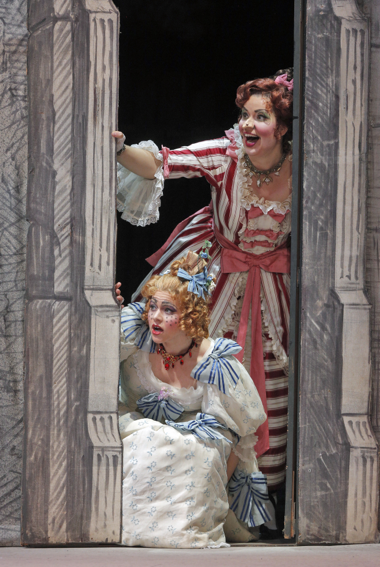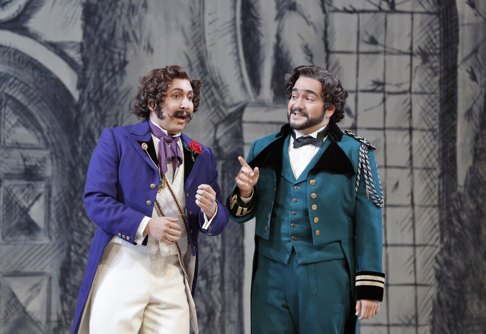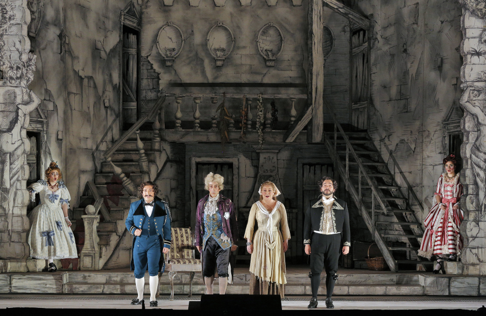
19 Nov 2014
La cenerentola in San Francisco
The good news is that you don’t have to go all the way to Pesaro for great Rossini.
English Touring Opera are delighted to announce a season of lyric monodramas to tour nationally from October to December. The season features music for solo singer and piano by Argento, Britten, Tippett and Shostakovich with a bold and inventive approach to making opera during social distancing.
This tenth of ten Live from London concerts was in fact a recorded live performance from California. It was no less enjoyable for that, and it was also uplifting to learn that this wasn’t in fact the ‘last’ LfL event that we will be able to enjoy, courtesy of VOCES8 and their fellow vocal ensembles (more below …).
Ever since Wigmore Hall announced their superb series of autumn concerts, all streamed live and available free of charge, I’d been looking forward to this song recital by Ian Bostridge and Imogen Cooper.
The Sixteen continues its exploration of Henry Purcell’s Welcome Songs for Charles II. As with Robert King’s pioneering Purcell series begun over thirty years ago for Hyperion, Harry Christophers is recording two Welcome Songs per disc.
Although Stile Antico’s programme article for their Live from London recital introduced their selection from the many treasures of the English Renaissance in the context of the theological debates and upheavals of the Tudor and Elizabethan years, their performance was more evocative of private chamber music than of public liturgy.
In February this year, Albanian soprano Ermonela Jaho made a highly lauded debut recital at Wigmore Hall - a concert which both celebrated Opera Rara’s 50th anniversary and honoured the career of the Italian soprano Rosina Storchio (1872-1945), the star of verismo who created the title roles in Leoncavallo’s La bohème and Zazà, Mascagni’s Lodoletta and Puccini’s Madama Butterfly.
Evidently, face masks don’t stifle appreciative “Bravo!”s. And, reducing audience numbers doesn’t lower the volume of such acclamations. For, the audience at Wigmore Hall gave soprano Elizabeth Llewellyn and pianist Simon Lepper a greatly deserved warm reception and hearty response following this lunchtime recital of late-Romantic song.
Collapsology. Or, perhaps we should use the French word ‘Collapsologie’ because this is a transdisciplinary idea pretty much advocated by a series of French theorists - and apparently, mostly French theorists. It in essence focuses on the imminent collapse of modern society and all its layers - a series of escalating crises on a global scale: environmental, economic, geopolitical, governmental; the list is extensive.
For this week’s Live from London vocal recital we moved from the home of VOCES8, St Anne and St Agnes in the City of London, to Kings Place, where The Sixteen - who have been associate artists at the venue for some time - presented a programme of music and words bound together by the theme of ‘reflection’.
'Such is your divine Disposation that both you excellently understand, and royally entertaine the Exercise of Musicke.’
Amongst an avalanche of new Mahler recordings appearing at the moment (Das Lied von der Erde seems to be the most favoured, with three) this 1991 Mahler Second from the 2nd Kassel MahlerFest is one of the more interesting releases.
‘And there was war in heaven: Michael and his angels fought against the dragon; and the dragon fought and his angels, And prevailed not; neither was their place found any more in heaven … that old serpent … Satan, which deceiveth the whole world: he was cast out into the earth, and his angels were cast out with him.’
If there is one myth, it seems believed by some people today, that probably needs shattering it is that post-war recordings or performances of Wagner operas were always of exceptional quality. This 1949 Hamburg Tristan und Isolde is one of those recordings - though quite who is to blame for its many problems takes quite some unearthing.
There was never any doubt that the fifth of the twelve Met Stars Live in Concert broadcasts was going to be a palpably intense and vivid event, as well as a musically stunning and theatrically enervating experience.
‘Love’ was the theme for this Live from London performance by Apollo5. Given the complexity and diversity of that human emotion, and Apollo5’s reputation for versatility and diverse repertoire, ranging from Renaissance choral music to jazz, from contemporary classical works to popular song, it was no surprise that their programme spanned 500 years and several musical styles.
The Academy of St Martin in the Fields have titled their autumn series of eight concerts - which are taking place at 5pm and 7.30pm on two Saturdays each month at their home venue in Trafalgar Square, and being filmed for streaming the following Thursday - ‘re:connect’.
The London Symphony Orchestra opened their Autumn 2020 season with a homage to Oliver Knussen, who died at the age of 66 in July 2018. The programme traced a national musical lineage through the twentieth century, from Britten to Knussen, on to Mark-Anthony Turnage, and entwining the LSO and Rattle too.
With the Live from London digital vocal festival entering the second half of the series, the festival’s host, VOCES8, returned to their home at St Annes and St Agnes in the City of London to present a sequence of ‘Choral Dances’ - vocal music inspired by dance, embracing diverse genres from the Renaissance madrigal to swing jazz.
Just a few unison string wriggles from the opening of Mozart’s overture to Le nozze di Figaro are enough to make any opera-lover perch on the edge of their seat, in excited anticipation of the drama in music to come, so there could be no other curtain-raiser for this Gala Concert at the Royal Opera House, the latest instalment from ‘their House’ to ‘our houses’.
"Before the ending of the day, creator of all things, we pray that, with your accustomed mercy, you may watch over us."

The good news is that you don’t have to go all the way to Pesaro for great Rossini.
It was a rare evening, very rare, at San Francisco Opera when everything, almost everything, went together perfectly.
La cenerentola is Rossini’s most complex, and certainly greatest comedy. The competition is stiff indeed — L’italiana in Algeri (1812), Il turco in Italia (1814) and Il barbiere di Siviglia (1816). What separates Cenerentola (1817) and puts it way out front is the sheer size and number of its ensembles, big concerted pieces with four, five and six-voices, sometimes with chorus as well. These are the hallmarks of the great tragedies that begin with Otello (1816), the opera composed by Rossini immediately before Cenerentola.
Both Armida (1817), the tragedy written immediately after, and Cenerentola end with a huge showpiece aria for the prima donna. These years are the mature Rossini who demands big, virtuoso singers, like Cenerentola whose bravura alone must be sufficient to close the show and bring the audience to a level of delirium that made Rossini the most famous opera composer in the world.
Virtuoso singing and the sculpting of the highly sophisticated musical architecture of the arias and ensembles are the challenges of this great comedy, both challenges well met just now in San Francisco.
Conductor Jesús López-Cobos made a wunderkind debut at San Francisco Opera in 1972 at the age of thirty-two, and returned for the fall 1974 season, again for more of the big Verdi repertoire. Now, after an absence of forty years, he is back on the podium, a master of what some of us believe to be the epitome of what opera can be — the mature Rossini! The Rossini ethos is also the most delicate of all the great composers and it is sublime when it is revealed. This is very rare.
Conductor López-Cobos immediately took Rossini’s overture to the lightest boil. It was the bubbling of the tiny drops of the finest mineral water and the fleetness of a long distance runner, and it kept us there for the duration. In a Rossini tragedy the delight would be the suspension of time into pure lyricism (you forget to breathe), and the sheer joy of releasing emotion, tragic though it may be. In a comedy, you found a smile on your face, your foot marking the beat. Sheer delight. In Rossini, comedy or tragedy, it is the same music and the same joy of making that music.
The Lópes-Cobos tempos and his flights of Rossini’s sophisticated instrumentation were never indulged for effect. For example the patter pieces (when a male voice breaks into rapid words) did not so much amaze us with lightning speed as they amused us with rhythmic words. The ensembles never lost their individual voices by accelerandos intended to drive us to musical fulfillment, instead we remained immersed in the complexities of the ensembles. It was measured conducting that at once reconciled Rossini with his music and Rossini with the singers provided by San Francisco Opera.
 Efrain Solís as Dandini, René Barbera as Don Ramiro
Efrain Solís as Dandini, René Barbera as Don Ramiro
An announcement was made that French mezzo soprano Karine Deshayes was not feeling well and would not be at her best. As it was Mlle. Desayes displayed a reserved temperament and presence that left Cenerentola colorless for most of the evening. In the spectacular finale to the opera, “Non piu mesta” she did vocally approach the needed Rossini vocal excitement if not the personality. Had she not been indisposed perhaps her high notes would have been integrated into the smoother sounds of her lower voice.
Cenerentola’s father, Don Magnifico, was sung by Spanish bass-baritone Carlos Chausson. A seasoned interpreter of Rossini roles he was perfection itself in the delivery of this role as generic buffo. Bass-baritone Christian Van Horn, perfunctorily and colorlessly (fault of the staging) enacted Alidoro, the facilitator of the familiar story.
 Production by Jean-Pierre Ponnelle
Production by Jean-Pierre Ponnelle
Young Texan tenor René Barbera made a splendid prince aka Don Ramiro in beautiful, smooth voice throughout the role’s very high tessitura. He delivered his big second act cabelletta “Si, ritrovarla io giuro” with the voice and personality that have made him the winner of vocal competitions and with high C’s to spare.
Among San Francisco’s great treasures are the Adlers. These young singers are usually the messengers and maids in the grand repertoire, and sometimes are over-parted in important roles. In this Cenerentola production they were utter perfection as Dandini and the ugly step sisters Clorinda and Tisbe. Both Maria Valdes and Zanda Svede made these minor roles (only Clorinda has a very brief aria) into scene stealing roles with the help of their stage director, Gregory Fortner.
But the biggest star of the evening (and it was a stiff competition) was California baritone Efrain Solis as the prince’s servant Dandini. This young singer exuded the charm, pent-up fun and exuberant singing that will make him a Rossini star. The cherry-atop-the-cake was the physical resemblance of Dandini, the servant, to Don Ramiro, the prince whom he was impersonating.
In its heyday San Francisco Opera not only discovered Jesus Lopez-Cobos but also Jean Pierre Ponnelle, a young French scenographer who revolutionized San Francisco’s idea of what opera production could be. This brilliant designer turned stage director created this production of La cenerentola for San Francisco Opera back in 1969 — forty-five years ago! Its black and white, pencil drawn filigree and apparent architecture (cross-section of a multi-storied house) make it both storybook and physically tangible. It is self-consciously old and that alone made it new back in the ’60’s. More importantly its decor is integrated into action — the actors climb throughout the set — it was opera as scenographic action, not just singing.
The limitation of the Ponnelle set is however its symmetry, and it is stifling. The larger Rossini repertory was just being re-discovered back then. Since then Rossini performance practice has evolved to understand and embrace the structural complexity of these works. A mise-en-scène now must incorporate the musical score as a physical and intellectual component of the staging. This can be accomplished by imposing concept and shape as powerful as the music — strength of concept is no longer perceptible in this antique production.
Jean-Pierre Ponnelle who died in 1988 has long since not been a part of his production. It has been staged in recent revivals by Gregory Fortner who has staged this gifted cast in San Francisco as well. One assumes he kept the basic outlines of the original staging, respecting the symmetry of the set. He certainly will have added clever schtick to keep the action energized and to showcase his performers.
It is time to memorialize the Ponnelle production in photographs and move on to productions consistent with current performance practice.
Michael Milenski
Casts and production information:
Cenerentola: Karine Deshayes; Don Ramiro: René Barbera; Dandini: Efrain Solis; Don Magnifico: Carlos Chausson; Alidoro: Christian Van Horn; Clorinda: Maria Valdes; Tisbe: Zanda Svede. San Francisco Opera Chorus and Orchestra. Conductor: Jésus López-Cobos. Production: Jean-Pierre Ponnelle; Stage Director: Gregory Fortner; Lighting Designer: Gary Marder. War Memorial Opera House, San Francisco, November 13, 2014. Seats: 11th row house left.